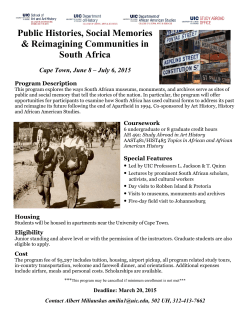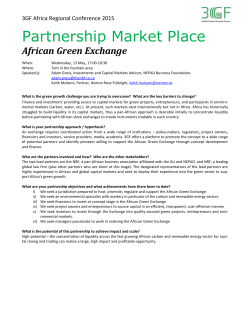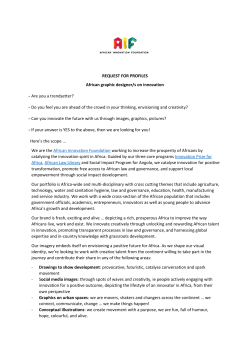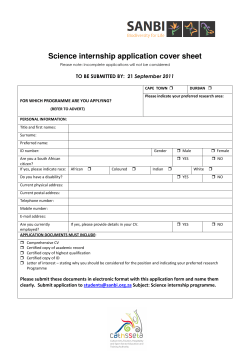
Télécharger le document - Business & Human Rights Resource
AFRICAN UNION African Commission on Human & Peoples' Rights UNION AFRICAINE UNIAO AFRICANA m Commission Africaine des Droits de l'Homme & des Peuples No. 31 Bijilo Annex Lay-out, Kombo North District, Western Region, P. 0. Box 673, Banjul, The Gambia Tel: (220) 441 0505 /441 05 06, Fax: (220) 441 05 04 E-mail: au-banjul@africa-union.org; Web www.achpr.org Ref: ACHPR/LPROT/SM/FOE Date: 23 March 2015 His Excellency Jose Eduardo dos Santos President of the Republic of Angola Office of the Presidency Luanda Angola Your Excellency, Subject: Joint Appeal by the Special Rapporteur on Freedom of Expression and Access to Information in Africa and the UN Special Rapporteur on the Right to Freedom of Opinion and Expression concerning Mr. Rafael Marques de Morais We have the honour to address Your Excellency, in our capacities as the Special Rapporteur on Freedom of Expression and Access to Information in Africa,1 and the United Nations Special Rapporteur on the Right to Freedom of Opinion and Expression,2 regarding the forthcoming trial of Mr. Rafael Marques de Morais, an Angolan journalist 1 A special mechanism of the African Commission on Human and Peoples' Rights appointed pursuant to Resolution on Freedom of Expression and Access to Information in Africa, ACHPR/Res.84 (XXXXV)05, adopted by the Commission on 05 December 2005. 2Pursuant to the United Nations Human Rights Council resolution 25/2 1 and human rights defender, on charges of defamation, which is scheduled to commence on 24 March 2015. Your Excellency, according to the information we received, Mr. Marques was indicted in January 2013 on charges of defamation in relation to his book titled "Blood Diamonds: Corruption and Torture in Angola" which was published in Portugal, in 2011. It is alleged that following criminal complaints by seven Angolan generals, a civilian, two mining companies and a private security company implicated in the book, eleven (11) charges of criminal defamation were brought against Mr. Marques. It is further alleged that a number of procedural irregularities have occurred during the pre-trial period of Mr. Marques' trial, for example Mr. Marques was given a five (5) day deadline to make submissions on the merits of his case and submit a list of witnesses, while access to the case file was withheld, thereby rendering it difficult to present any meaningful arguments. Your Excellency, without in any way reaching conclusions on the above reports, we are concerned that if indeed these reports are accurate, it would amount to a failure on the part of the Government of the Republic of Angola to fulfil its obligations to uphold the right to freedom of expression. As you are aware, Angola is a State Party to the African Charter on Human and Peoples' Rights (the African Charter) and the International Covenant on Civil and Political Rights (ICCPR). Articles 9 and 19, of the African Charter and the ICCPR respectively, protect the right of every individual to receive information and to express and disseminate his or her opinion within the law. By virtue of these provisions, the right of every individual to receive information and to express and disseminate his or her opinions ought to be guaranteed. May we also bring to the kind attention of Your Excellency the Declaration of Principles on Freedom of Expression in Africa (the Declaration), adopted by the African 2 Commission on Human and Peoples' Rights (the Commission) during its 32nd Ordinary Session in October 2002, to supplement the provisions of Article 9 of the African Charter. Principles I (1) and II of the Declaration respectively state that freedom of expression "is afundamental and inalienable human right and an indispensable component ofdemocracy" and "any restrictions on freedom of expression shall be provided by law, serve a legitimate interest and be necessary in a democratic society." Your Excellency, Principle XII (I) of the Declaration, specifically provides that: States should ensure that their laws relating to defamation conform to the following standards: • no one shall be found liable for true statements, opinions or statements regarding public figures which it was reasonable to make in the circumstances; • public figures shall be required to tolerate a greater degree of criticism; and • sanctions shall never be so severe as to inhibit the right to freedom of expression, including by others. In this regard, the African Commission has consistently called on Member States to the African Charter to repeal criminal defamation laws and to repeal or amend all other similar criminal laws, such as false news, insult and sedition, which restrict the enjoyment of freedom of expression. To this end, the African Commission adopted a Resolution on Repealing Criminal Defamation Laws in Africa3 which calls on State Parties to repeal criminal defamation laws or insult laws which impede freedom of speech, and adhere to the provisions of freedom of expression articulated in the African Charter, the Declaration, and other regional and international instruments. 3ACHPR/Res.l69(XLVlll)10, adopted during 48th Ordinary Session, held in Banjul, The Banjul, from 10-24 November 2010 Furthermore,we would like to draw the attention of Your Excellency to a recent decision of the African Court on Human and Peoples' Rights (the Court), in Application No. 004/2013 - Lohe Issa Konate v. Burkina Faso, delivered on 05 December 2014, in which the Court unanimously ruled that imprisonment for defamation violates the right to freedom of expression and that criminal defamation laws should only be used in restricted circumstances. At global level, the approach to defamation is similar. The Human Rights Council in its Resolution 1^/16 called upon all States to refrain from the use of imprisonment or the imposition of fines for offences relating to the media, which are disproportionate to the gravity of the offence and which violate international human rights law. Furthermore, the Human Rights Committee in its General Comment 34 on the right to freedom of opinion and expression (Article 19 of the ICCPR) indicates that "State Parties should consider the decriminalization of defamation and, in any case, the application of the criminal law should only be countenanced in the most serious of cases and imprisonment is never an appropriate penalty." In light of the above, we respectfully request the Government of the Republic of Angola to repeal its criminal defamation laws and end prosecutions on the basis of these laws. With regards to Mr. Marques, we call on the Angolan authorities to ensure protection of his rights guaranteed under the African Charter, in particular the right of all persons to a fair trial in accordance with the African Commission's Principles and Guidelines on the Right to a Fair Trial and Legal Assistance in Africa. We sincerely hope that this appeal will receive Your Excellency's favourable attention and prompt response. Please note that in line with the mandate and responsibility of Members of the African Commission to report on complaints of violations of articles of the African Charter, this communication as well as the contents of any response received from Your Excellency's Government will beincluded in the Report submitted to the 56th Ordinary Session ofthe African Commission. Please accept, Your Excellency, the assurances ofour highest consideration. Special Rapporteur of Expression and Access to Information in Africa \ Mr. David Kaye UN Special Rapporteur on the Rightto Freedom of Opinion and Expression
© Copyright 2025









